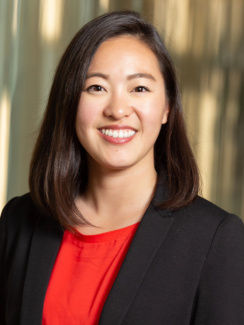Through Social Distancing Comes a Societal Reckoning

By Katie Lin (she/her/hers), MBA ‘21
At the start of summer break, it seemed like the biggest issue in the world was this new, unknown virus that we had to face together. However, in May, national media attention for the murders of Ahmaud Arbery, George Floyd, and Breonna Taylor triggered the reignition of a flame that had been burning steadily throughout American history: a desire to be treated as equals, no matter the color of your skin. Suddenly, the time spent at home distancing from friends was given over to discussions about race and anti-racism. Book clubs sprang up – we had the time, after all, to continue to educate ourselves. Lists of documentaries, podcasts, black-owned bookstores, and small businesses were compiled and sent onward to fuel someone else’s journey.
As an Asian woman who grew up in the middle of a fairly white neighborhood, I didn’t face the outright racism that my Black and brown peers shared. Mine was a quieter kind – a feeling of not quite belonging, a recognition of the fact that I was considered “diversity” in a predominantly white office. However, the rise of COVID-19-related racist remarks revealed that I, too, would always be seen as “other,” as “lesser.”
When our MBA Council VP of diversity and inclusion announced a four-part program to provide a space to explore the concept of allyship and continue the introspection many of us had started in May, I signed up immediately. I expected that the sessions would allow me to learn a framework to thoughtfully engage, learn, practice, and plan what it means to actively pursue social justice on a daily basis.
An opportunity to step out of my own experience and connect more deeply with my peers
After only the first session, I realized my expectations for the program weren’t complete: More important than the framework, Allyship 101 provided the opportunity to step out of my own experience and connect more deeply with my fellow participants.
Each week, we met as a group to review a new allyship concept, whether it was the 4 I’s of oppression or an expanded list of identities. Within each session, there was time devoted to breakout groups; I was often paired with MBAs I hadn’t met or gotten to know well last year. We shared our previous experiences, discussed our understanding or confusion of the concepts covered, and came to new conclusions and new perspectives together. As a woman of color, the experiences of my fellow participants were illuminating, highlighting perspectives I didn’t know that I didn’t know about until they were shared: growing up white in a predominantly white area and the culture shock associated with moving to a more diverse city or school, the familial and societal pressures faced by first-generation college students, the privileges of identities beyond race and gender.
My Allyship 101 dialogue partner, a cis white male, and I met each week between sessions to build upon the dialogue that had begun. We found that we each had experienced incidents where we didn’t know how to respond, despite knowing the situation felt wrong. Together, we used Allyship 101 concepts to deconstruct what actions were available to us, at which points an intervention could have been staged, and how to identify and respond to similar events in the future. While neither of us have the correct answer, I’ve learned through this program that the best solutions come when we are able to step out of our shoes to understand another perspective, and when we have the opportunity to discuss our past behaviors in an effort to improve future solutions.
While Allyship 101 as a formal program was short, the concepts and resources, not to mention the stories in breakout groups, that were shared will stay with me throughout my final year at Ross and beyond.
My dialogue partner and I continue to meet to this day – using our time together to review and provide feedback on how to tackle the issues we face as business students (and later, as business leaders). I’ve shared resources and concepts covered in Allyship 101 in conversations with my non-Ross friends, family, and fellow interns. And I know that being able to learn from different perspectives is not only an asset for my career, but also an imperative as we continue the work to form a more perfect union and live up to its promise of liberty and justice for all.








